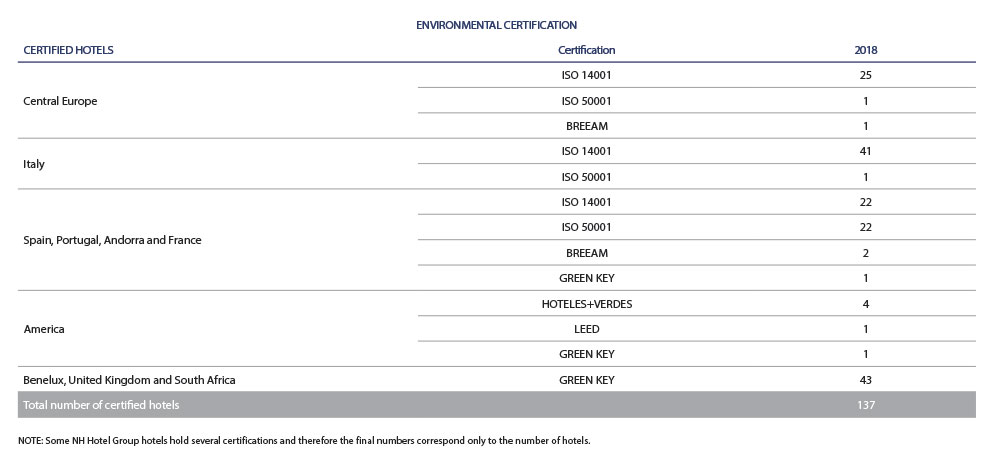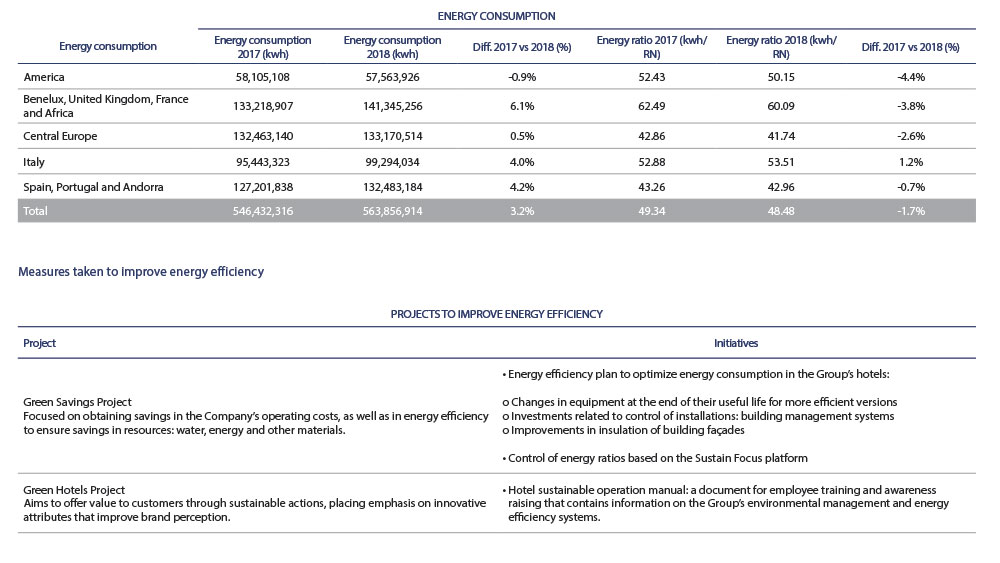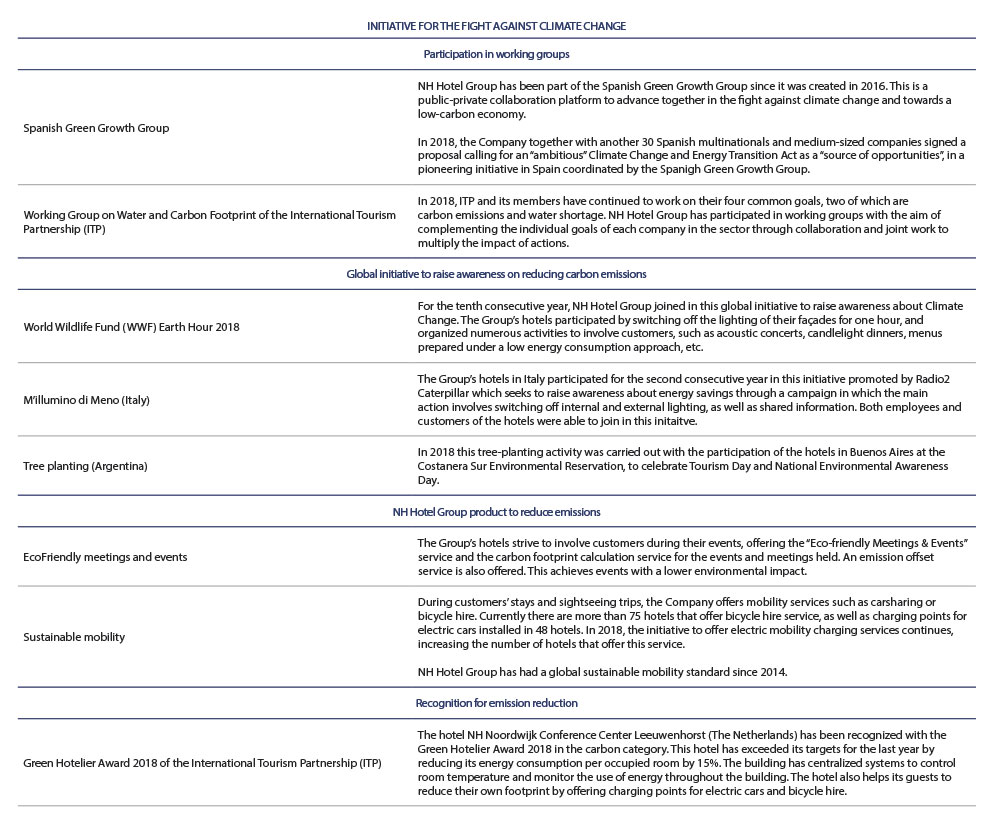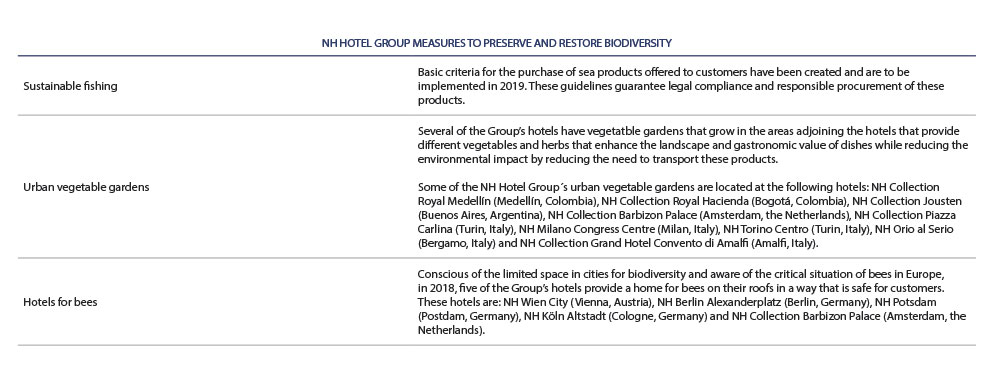Environmental Risk Prevention
Environmental risks are identified on the Company’s risk map. They are also contemplated in the Room 4 Planet initiative of the Corporate Responsibility Plan 2017-2019 of NH Hotel Group.
Through the Corporate Responsibility Plan, the Group works to minimize the impact of climate change, increase the efficiency of resources and develop new, more sustainable products.
For the management of the environmental strategy, the Company has a Corporate Environment Department which reports to Operations Management. Furthermore, with the aim of preventing and reducing environmental risks and impacts, teams from different areas, both at corporate and business unit and hotel level, work in coordination on three main areas:
1. Energy efficiency: improvement in the use of energy resources through changes in equipment and adjustments of systems in buildings. In 2018, a total of 6.9 M€ have been invested in improving the Company’s energy efficiency.
2. Environmental certification: implementation of relevant and recognized environmental certification in the NH Hotel Group portfolio.
3. Control of consumption rates: exhaustive and rigorous supervision of the measures implemented in relation to energy consumption, carbon footprint and water consumption. The sustainability indicators are monitored using the Sustain Focus online platform, accessed from the Company’s hotels, which lets indicators such as water and energy consumption, among others, be reported, controlled, monitored and traced.
Provisions and safeguards for environmental risks
NH Hotel Group makes investments in environmental activities that are stated at cost and capitalized as a higher cost of fixed assets or inventories in the year in which they are incurred.
Expenses derived from the protection and improvement of the environment are recorded in the income statement in the year in which they incur, independently of when the associated monetary or financial flow takes place.
Provisions related to likely or certain liabilities, ongoing litigation and ongoing damage compensation or obligations relating to the environment, the amount of which has not been determined, not covered by the Company’s insurance policies, are set up at the start of the liability or obligation that determines a possible compensation or payment.
Waste Management and Circular Economy
Waste Management Plan
NH Hotel Group has implemented in all its hotels a system of waste separation at the point of origin to permit recycling. The types of waste separated are: paper and cardboard, glass, used oil, plastic packaging, cartons and tins and organic. This system permits the recovery of material for recycling and subsequent valuation. Hazardous waste is separated according to the legal requisites of each region. Withdrawn furniture and fittings that are in good condition during refurbishment processes may be given away to employees or donated to local organizations.
In 2018, an analysis was carried out to identify potential significant sources of scope 3 emissions, among which the waste generated was identified. To obtain the necessary information to estimate such emissions, a tool has been designed which is expected to allow a more efficient monitoring of waste generation and treatment.
Collaboration with suppliers
In 2018, participation commenced in the programme for the recovery of aluminium coffee capsules by the Company’s coffee suppliers, thus reducing the impact these capsules generate on the environment.
In 2018, the NH Hotel Group hotels in the city of Buenos Aires started to collect used soap in order to donate it to the SOS Jabón solidarity recycling program, which consists of processing soap in order to manufacture new bars of soap, which are donated to vulnerable communities.
At NH Royal Terra 100 (Bogotá, Colombia) unused soap is also separated to be used and revalued into other products. Thanks to the collaboration with the processing company, this product becomes soap for pets, and after chemical processing, it is also used for plant fertilizer.
NH Hotel Group’s participation in events on circular economy and waste management
During 2018, both the Company and different hotels of the Group participated in several events and forums on circular economy and waste management.









